Beckett at Exeter
The novelist, short story writer, and dramatist Samuel Beckett (1906-1989) was awarded the Nobel Prize for Literature in 1969 and he remains centrally important to our understanding of twentieth-century literature and its aftermaths.
Beckett appears in several places on our English BA degree. By my count, his work features on at least four modules, and I teach his Fizzle 6 on a second-year critical theory module entitled Humanities After the Human.
This is hardly a surprise, since we have some of the world’s best Beckett scholars at Exeter! Dr John Bolin‘s Beckett and the Modern Novel inserts the writer into the tradition of the modern European novel.
Another of my colleagues Dr Beci Carver researches and teaches Beckett, especially his novel Watt, which features in her book Granular Modernism.
And to end (yet again, as Beckett might say) Beckett is also a major presence in the work of my colleague Professor Laura Salisbury, who wrote her first book on Beckett and humour. She was talking about him on Radio 4 last month and you can listen to what she said here.
I was tempted to call this post something like ‘Beckseter.’ Aren’t you glad I spared you that!
The Year of the Pig
Today the University of Exeter celebrated Chinese New Year with a festival presented by the Chinese Student Scholars Association. I caught the parade as it started down the High Street…
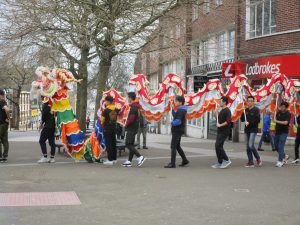
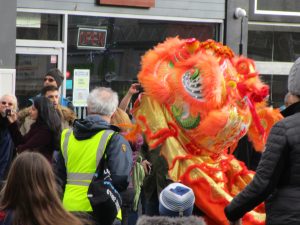
… and then there was Dragon and Lion traditional dancing in front of Exeter Cathedral!
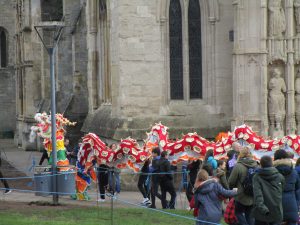
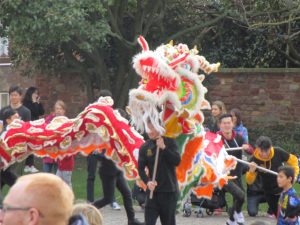
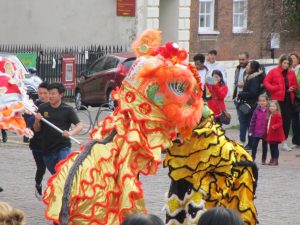
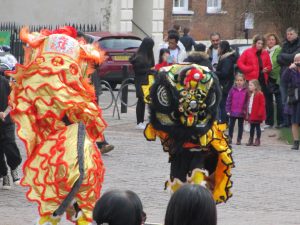
The parade continued through the city centre and onto campus, where more events were planned for the rest of the day.
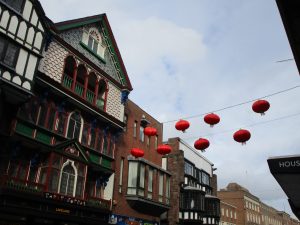
At Exeter we’re committed to thinking about culture in a global context and seeing the parade reminded me of the Department of English & Film’s connections to Chinese performance, art, and literature! Here are just three examples:
My colleague Professor Nick Kaye has extensive research links with Chinese researchers and cultural institutions and one of his new projects involves engaging new urban audiences with traditional Chinese opera via digital mediation; Nick is working with Shanghai All-Female Yue Opera, the only all-female Chinese opera.
Professor Regenia Gagnier has just published a book entitled Literatures of Liberalization: Global Circulation and the Long Nineteenth Century which is centred on two of Regenia’s big interests: the global history of liberalism as a concept and the migration of literary texts around the world. Where the latter is concerned, Regenia has tracked the planetary circulation of decadent literature and the novels of Charles Dickens. China regularly features in her thinking and she has written about how both literature and liberalism have been translated, adapted, and negotiated in modern China.
Finally, Professor Corinna Wagner specializes in the relationship between art, literature, disease, and the body, and regularly writes about medical illustrations during the eighteenth and nineteenth centuries. Corinna is also interested in global circulation and her publications include an article comparing Joseph Towne collection of anatomical waxes with the Lam Qua paintings of the patients of medical missionary Peter Parker. Corinna is giving the sample lecture at this Wednesday’s Offer-Holder Visit Day and I imagine medicine and the body will come up again!
Dion Boucicault on a sunny Monday morning
This morning, I gave a lecture to our second year students on the nineteenth-century playwright and actor, Dion Boucicault. The lecture was given as part of our level 2 module, Crossing the Water: Transatlantic Literary Relations, but it could easily have appeared on one of our numerous Victorian Literature and Culture modules. My Victorianist colleagues Prof. Joe Kember and Prof. John Plunkett are very interested in popular forms of entertainment in the nineteenth and early twentieth centuries, of which Boucicault’s body of work (in “melodrama”) is an excellent example.
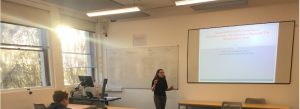
Dion Boucicault was an Irish-born playwright who was enormously successful in the nineteenth century theatre on both sides of the Atlantic. His first hit play was London Assurance in 1841. Our students study two of Boucicault’s plays: The Octoroon (first performed in New York in 1859) and The Shaughraun (first performed in New York in 1874). The plays fit really well with the themes of the module, which is concerned with the transatlantic circulation of authors, print culture and performances from the nineteenth century to today. It encourages students to consider how such works transcend national boundaries and configurations. The concerns of the module dovetail with my own research interests in the Irish Atlantic and the figure of the “Returned Yank” in the cultural imagination.
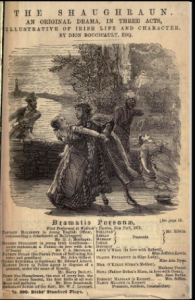
The question of genre is very important to the study of Boucicault. I draw students’ attention to the fact that, despite the seeming local specificities of the two plays (the one set in Louisiana during the time of slavery; the other set in rural Ireland), there are numerous similarities between the two, similarities that owe themselves to the overarching melodramatic form so beloved of Boucicault.
Boucicault has enjoyed something of a revival on both the stage and in scholarly contexts over the past several years. In 2004, the Abbey Theatre in Dublin – Ireland’s national theatre – revived The Shaughraun for its centenary celebrations, where it received mixed reviews. The staging of the play was somewhat controversial because the Abbey Theatre had been founded with a mission to do away with “buffoonery and easy sentiment,” the latter defining features (some would argue) of The Shaughraun.
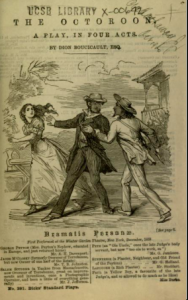
The Octoroon has also been subject to re-staging and rethinking. The African American playwright, Branden Jacobs-Jenkins, adapted and reframed Boucicault’s work in a play renamed as An Octoroon which premiered in New York in 2014 and was later staged in London at the National Theatre in 2018.
Enter the Bill Douglas Cinema Museum…
The University of Exeter is blessed with many unique archival resources that we integrate into our teaching: Victorian periodicals, writers’ papers, collections of historical documents, and over the course of the term I’ll say a bit about them all. Today I am going to spotlight the treasure trove of popular culture history that is the Bill Douglas Cinema Museum, which never ceases to inspire us and our students!
The BDCM contains the sorts of items you would expect in a museum devoted to the cinema: old filmmaking equipment, ephemera (e.g. postcards, cigarette cards, toys) relating to major movie stars such as Charlie Chaplin and Marilyn Monroe, posters and programmes for film showings, original cel artwork from Disney films, fan magazines, and documents that used to belong to filmmakers (the Lumière brothers, for instance).
But the BDCM also covers hundreds of years of the moving image! So it has significant collections of panorama, magic lantern slides, stereoscopes, kaleidoscopes, and peep shows. These are an invaluable resource for students who are reading eighteenth- and nineteenth-century literature: we can see for ourselves the objects and experiences being described by novelists and poets. These materials also provide a rich insight into the history of popular visual culture, running right up to the era of the cinema!
Myself and my colleague Dr Sinéad Moynihan were doing some teaching in the BDCM recently. This was on an MA module called The Literature of Cold War America and the particular topic that week was the blacklist and the anti-communist witch-hunts of mid-century America. We covered a lot of different texts in the seminar, such as the BDCM’s collection of 1950s books and pamphlets that investigated whether or not the film industry really had been infiltrated by communist subversives.
We started by thinking about the African-American performers, writers, and political activists under FBI surveillance during the 1950s. To this end, we looked at the material from the BDCM relating to Paul Robeson, the singer prevented from leaving the country in 1950; later that year he started a political newspaper entitled Freedom. One item in the BDCM collection is the souvenir programme for Robeson’s 1958 UK tour – which he undertook as soon as his passport was restored. The students also read short stories by the writer Alice Childress and thought about their different publication contexts (e.g. how the stories published in Freedom in 1951 compared to their republication in The Baltimore Afro-American in 1956).
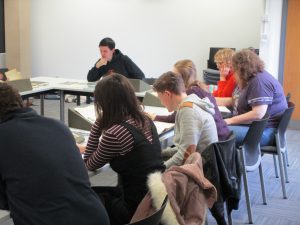
Here are the students looking at film fan magazines, lobby cards, movie posters, and postcards relating to Marlon Brando, star of the 1954 film On the Waterfront. We discussed what Brando’s celebrity and acting style might say about the United States in the 1950s, torn between swaggering confidence and deep-seated anxiety.
The BDCM offers students the opportunity to volunteer and gain experience of working in the museum sector and modules such as British Screens have curatorial activities built into them. You can see the display cases that students have put together as soon as you enter! If you’re visiting Exeter in the coming months, the BDCM is definitely worth checking out, and you can see the student-curated displays for yourself!
Dissertation time!
This week I joined my colleagues Dr Felicity Henderson and Dr Jana Funke for a lecture on ethics and interviewing people. This was aimed at our final-year undergraduates, who are busy researching their dissertations right now. The English dissertation is an 8,000-word extended essay where students shape a distinctive research project in consultation with a member of academic staff. As well as tutorials with their dissertation tutor, students benefit from workshops and a weekly lecture based on sharing tips and advice on how to complete the dissertation. In this week’s lecture we helped the dissertation students think about the following: what ethical issues does your research generate? Are there certain principles by which you should always abide when devising the collection and publication of data? And what is good practice if your dissertation involves interviewing people?
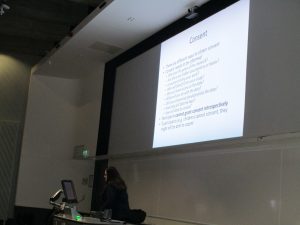
Jana is the ideal person to talk about research ethics, since she is Chair of the College of Humanities Ethics Committee. You can see from her slide that she talked about the importance of getting informed consent from participants in our research.
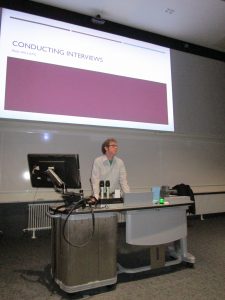
I spoke about how to run interviews: organizing them in advance, learning to be a good listener, and tips on transcribing them afterwards. Based on my own experience I recommend that students avoid interviewing anyone next to a busy road on a windy day in a major city!
So what do the students write about in their dissertations? There is no ‘one-size-fits all’ template for a dissertation; they are as varied as our students’ research interests. To give you an idea, here are some dissertation titles from recent years:
- “Becoming a ‘Conceptual Bastard’: The Relationship Between Visual Culture and the Sexualization of Black Women’s Bodies from Humanism to Posthumanism”
- “‘Beth Redy for to Meete Hym Everemoore’: A Study of Death Personified in Three Medieval Texts”
- “Simile, Difference, and Translation in Christopher Logue’s War Music“
- “Animal Identity, Jungle Ruins and Adapted Environments: Postcolonial Ecocriticism in The Jungle Book(s)“
- Misinterpreting Allegory: Paradise Lost and Its Critics”
- “‘The Stranger Acclimatizes Everyday’: Reconceptualizing Liminality in the Palestinian Context”
- “‘It’s Aggressive But Sometimes You Need to Shout to Get the Point Across’: Grime and ‘Road Rap’ as a Challenge to Postimperial Melancholic Interpretations of the 2011 London Riots”
The dissertation is a challenging endeavour but it gives students the chance to take all the skills and knowledge they have gained over their degree and bring them to bear on a subject that they are passionate about. Within the framework of supervision, workshops, and lectures, they can craft a project that reflects their own interests, and pursuing a self-motivated research project where you have to set yourself targets and deadlines is great experience for whatever you do after your BA degree!
Last but definitely not least, the Department of English & Film at Exeter gives a prize for the undergraduate dissertation that best communicates the qualities of imagination and intellectual flair. Last year this award (the Gamini Salgado Prize) was presented to Rebecca Young for “‘See Her Brain – Go Round’: Emily Dickinson, Neurodiversity and the Matter of the Brain.” Well done Rebecca!
This doesn’t even cover the Creative Writing dissertation – come back later and I’ll tell you all about that too!